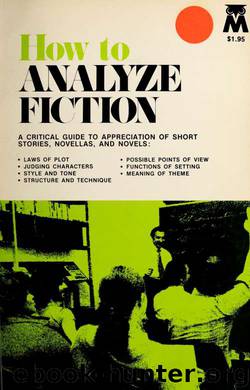How to analyze fiction by Kenney W. P. (William Patrick) 1933-

Author:Kenney, W. P. (William Patrick), 1933-
Language: eng
Format: epub
Tags: General, Study Aids, Study Guides, Fiction, History and criticism
Publisher: New York, Distributed by Monarch Press
Published: 1966-10-25T16:00:00+00:00
But in the discussion of literature, we always come at last to the act of judgment. A number of standards for evaluating style have been suggested at one time or another. For some critics economy is the supreme virtue; the writer must on no account use more words than are necessary. We may assent to this standard in a general way and still ask, "necessary to what?" Other critics prize concreteness above all else; yet we must recognize that the degree of concreteness in a given writer's style may quite properly be determined by the overall design of his work.
What we need, then, is a standard that will serve as a fairly useful guide and still remain flexible enough to prevent our condemning a writer for not achieving what he quite properly never attempted. The only standard I have ever found that meets these conditions is appropriateness; the style must be appropriate. If I am asked, "appropriate to what?" I can only answer, "To everything else in the work." Style, then, like every element of fiction, must ultimately be judged by its contribution to the artistic whole.
STYLE IS THE MAN: The assertion, "The style is the man," is commonly made in literary criticism. This assertion is relevant to our consideration of style in fiction. Part of our experience of the total work of fiction is our sense of the author, our awareness of and response to the qualities of his mind and personality. And the author reveals these qualities nowhere more clearly than in his style. For the choice of words and the arrangement of words into larger units such as the phrase, the sentence, the paragraph, are not merely mechanical processes. A writer's style can reveal to us his way of perceiving experience and of organizing his perceptions. The differences in style between a Dreiser and a James are ultimately differences of mind and personality.
But it may be objected that the style of many writers, including the authors of many best-selling novels and of stories in widely read magazines, is nothing more than a matter of formula. How can a formula reveal an individual writer's qualities of mind and personality? But doesn't one writer's willing submission to formula reveal such qualities as well as another writer's resistance to formula?
Download
This site does not store any files on its server. We only index and link to content provided by other sites. Please contact the content providers to delete copyright contents if any and email us, we'll remove relevant links or contents immediately.
A Swirl of Ocean by Melissa Sarno(51032)
The Book of Dreams (Saxon Series) by Severin Tim(33384)
Cecilia; Or, Memoirs of an Heiress — Volume 1 by Fanny Burney(32558)
Cecilia; Or, Memoirs of an Heiress — Volume 2 by Fanny Burney(31956)
Cecilia; Or, Memoirs of an Heiress — Volume 3 by Fanny Burney(31940)
Call Me by Your Name by André Aciman(20514)
Eleanor and Park by Rainbow Rowell(15463)
Always and Forever, Lara Jean by Jenny Han(14920)
For the Love of Europe by Rick Steves(14121)
Norse Mythology by Gaiman Neil(13363)
Crooked Kingdom: Book 2 (Six of Crows) by Bardugo Leigh(12318)
Shadow Children #03 - Among the Betrayed by Margaret Peterson Haddix(11928)
Among the Betrayed by Margaret Peterson Haddix(11612)
Twisted Palace by Erin Watt(11151)
Six of Crows by Leigh Bardugo(10200)
They Both Die at the End by Adam Silvera(9818)
P.S. I Still Love You by Jenny Han(9584)
Fangirl by Rainbow Rowell(9247)
Thirteen Reasons Why by Jay Asher(8907)
